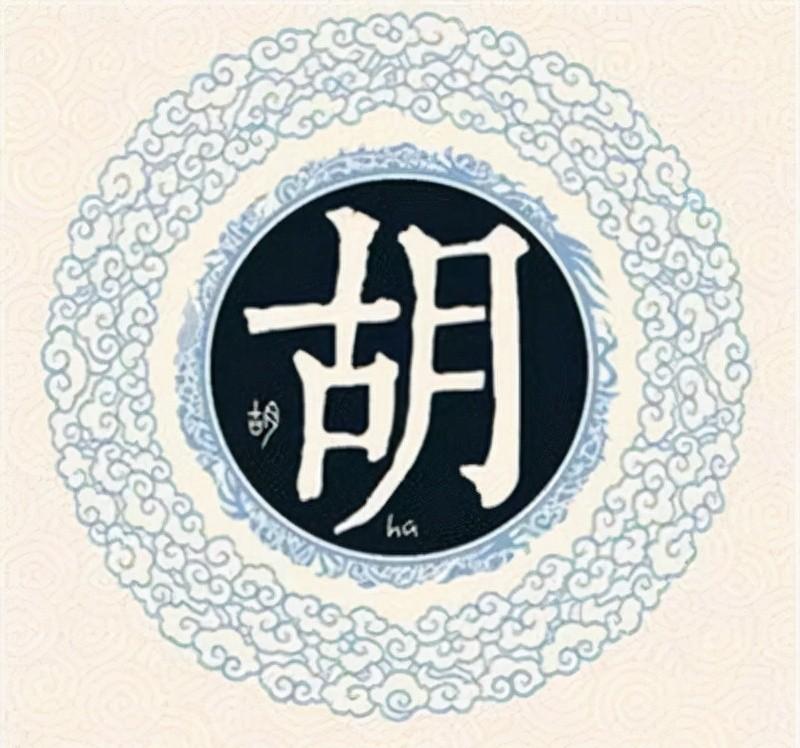As of now, the total population of Hu surname has been about 20 million, ranking 13th in China's surname population, today we will talk about the origin of Hu surname.

The first branch of origin: derived from the surname of Concubine. The 33rd descendant of Emperor Shun of the Ancients was named Concubine Man. After King Wu of Zhou destroyed the Shang Dynasty, he searched the whole country for the descendants of the previous emperors, so he found Emperor Shun's descendant Concubine Man, and married his eldest daughter, Yue Daji, to Concubine Man, and divided the Zhuye of Chen Di (that is, the present-day Town of Huxiang in Zhaocheng, Henan) to Concubine Man, giving the country the name "Chen Guo", whose main job was to be responsible for the affairs of sacrifice. Concubine Man's courtesy name was Hu Gong (胡公), hence the name Hu Gongman (胡公满) or Chen Hu Gong (陈胡公). Later, the descendants of the Chen royal family and many of the Chinese people took the ancestral name "Hu" as the surname, which is the origin of the "Hu" surname.
The ancestor of the Hu surname - Hu Gongman
It is worth saying that other descendants of Chen Guo also have the national name "Chen" as the surname, which is the origin of the "Chen" surname mentioned earlier. Speaking of concubines, after reading the previous articles, we all know that he is also the ancestor of the Concubine surname Sun. We can use the following diagram to clarify this relationship.
In addition, there is a descendant of the concubine surname Tian Bao: during the Warring States period, the Qi Xuan King of the State of Qi had a younger brother named Tian Bao, Tian Bao was divided by his brother Qi Xuan Wang in Wu Yang, probably located in today's Dongping, Shandong, and later Tian Bao became the XiangGuo of the State of Qi, because the ancestor of the Tian Qi royal family was the above-mentioned Hu Gongman, the fief was in Wu Yang, so the surname was "Hu Wu", and his descendants gradually reduced the "Hu Mu Clan" to a single surname Hu after the Jin Dynasty.
Hu, Sun and Chen surnames are related to each other
Second branch origin: derived from the return surname. During the Shang and Zhou Dynasties, there was a tribe called the "Guiyi Tribe", which belonged to the clan with the name of the country. The State of Guihu, roughly located in the area around Ruyin in Yingzhou (present-day Fuyang, Anhui), was a vassal state with the surname of Gui in the early Western Zhou Dynasty. At the end of the Spring and Autumn Period, the weak and small State of Hu was forced to join the alliance of princes led by the State of Chu, form a coalition to attack the State of Wu, and later participated in the "Battle of Yuzhang" between the State of Chu and the State of Wu, as a result, in the twelfth year of King Jing of Zhou (that is, in 508 BC), the King of Chu Zhao, Xiong Ren, rebelled, and on the way back from the "Battle of Yuzhang", he annexed the State of Guihu by the way. Later, the descendants of the Hu royal family took the name of their homeland "Hu" as their surname.
Third branch origin: derived from the Ji surname. During the Spring and Autumn Period, there was a small state surnamed Hu Guo, and in 763 BC, Zheng Guo attacked the Hu State. After the fall of Ji Hu, the descendants of hu state took the national name "Hu" as their clan.
The fourth branch originates: derived from the official position. During the Western Zhou Dynasty, there was an official named Hu Shi, whose main job was to manage the catering of the king's royal family and the sacrifice of the sacrifice ceremony, which was equivalent to the current leader of the catering department. Later, the descendants took the ancestral official position as their surname. In addition, during the time of Emperor Wu of the Han Dynasty, a military attaché was set up called Hu Qixiao Lieutenant, and some descendants took the ancestral official position as their surname.
Fifth Branch Origin: Other surnames changed. Here we will focus on the "Ming Jing Hu Clan". In the last year of the Tang Dynasty, Jiedu caused Zhu Wen to rebel, and Li Ye, the emperor of Tang Zhaozong at that time, wanted to avoid the disaster of extinction. He entrusted the young Tenth Prince to the close attendant Hu Sangong, who was a Wuyuan native and soon fled back to his hometown of Huizhou. Hu Sangong carefully raised the last bloodline of the Li royal family. For safety reasons, he changed the crown prince to Hu surname and named hu Changyi, who later took the name of Ming Jingke and Di, but Hu Changyi decided to quit the official field after learning of his origins. Since then, he has lived in seclusion and specialized in the study of scripture behind closed doors, and "Zhou Yi Concentration" is his masterpiece, known as "Ming Jinggong". Among the descendants of the "Ming Jing Hu Clan", there were few officials, and most of them were known for their learning and business. Among them, the red-top merchant Hu Xueyan, cultural celebrities Hu Kaiwen and Hu Shi are all from this branch. "Ming Jing Hu" is also known as "Li Gai Hu".
Ming Jing Hu Genealogical Order
In addition, like other surnames, many of the Hu surnames are changed from ethnic minorities, such as Mongolians and Manchus.
Well, today's hundred family names will talk about here, like friends please like to pay attention to Oh!